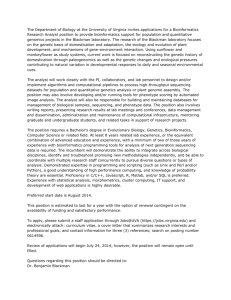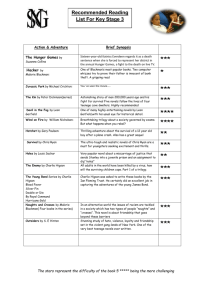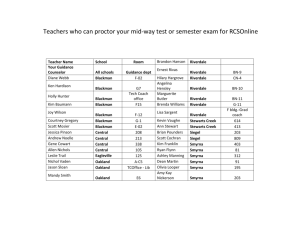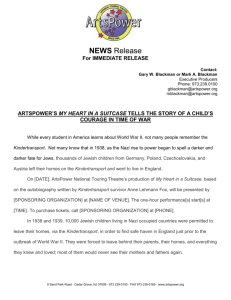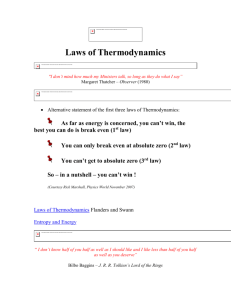Running head: PROJECT 2 FOR EDCI 6304
advertisement
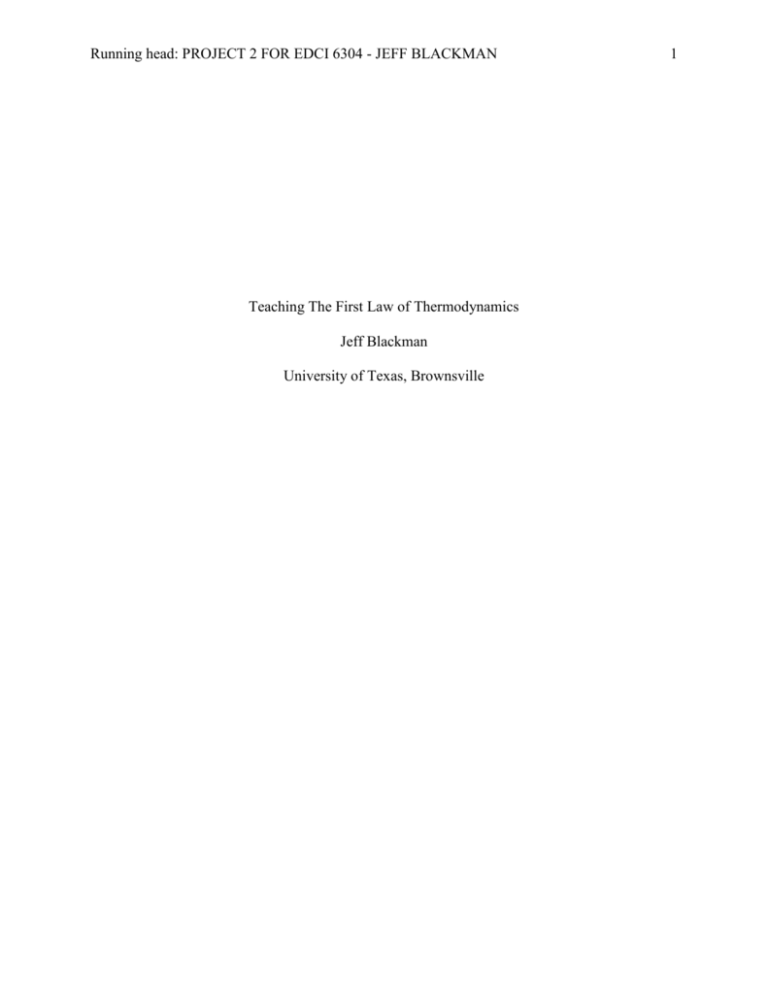
Running head: PROJECT 2 FOR EDCI 6304 - JEFF BLACKMAN Teaching The First Law of Thermodynamics Jeff Blackman University of Texas, Brownsville 1 PROJECT 2 FOR EDCI 6304 - JEFF BLACKMAN 2 Teaching the First Law of Thermodynamics Background Through word of mouth and student evaluations, Professor Blackman has discovered that his Physics 101 class has a reputation for being “boring” and “hard to understand”. Professor Blackman is passionate about physics and wants his students to feel the same way. He is going to start by redesigning one of his first lessons in which he introduces the laws of thermodynamics. Intended Audience The intended audience for this lesson is freshmen undergraduates attending an entry level physics class. Most of these students have attended a high school physics class. The degree to which they have retained information from those previous classes varies greatly. Some enter the class with a good foundation and others barely made it out of their high school with a passing grade in physics. Professor Blackman has given his incoming students a survey which asks both their opinions of the subject of physics as well as some questions to test their knowledge. He finds that the majority are taking the class as a requirement for their major and not because they are particularly eager to take the class. He sees many comments that indicate the students’ past experiences with physics has been less than positive. It also becomes apparent that most are lacking much of the fundamental knowledge needed to understand thermodynamics. (e.g. the three laws) PROJECT 2 FOR EDCI 6304 - JEFF BLACKMAN 3 Learning Objective The learning objective for this lecture will be for students to be able to remember the First Law of Thermodynamics and briefly explain it. Learning Activity As a result of his findings, Professor Blackman decides to start with the basics. He wants to make sure that students have a good understanding of what the laws of thermodynamics are before he embarks on more advanced topics. He also wants the lesson to have meaning. Instead of the typical “boring” lecture, he really wants to pique students’ interest. Professor Blackman knows that stories are an effective way to learn and are a great way to connect people and information. (Pasupathi, 2012) Professor Blackman plans to use storytelling as part of his lectures. Instead of just giving the information, Professor Blackman will also engage students with many of the “inside” stories that go along with the theories. In his first lecture, Professor Blackman will tell the true story about a Mississippi inventor, Joseph Newman, who claimed to have invented a machine that produced far more energy than it consumed. He (Newman) was turned down by the U.S. Patent Office and sued them. He convinced lawyers and congressmen that his machine was useful and that there was no reason the Patent Office should have turned him away. Even after his machine was proven to not work as he had stated, he continued to try to convince people to invest in it. He was even able to successfully reopen his case against the Patent Office. (Bartell, 2001) After telling this story, Professor Blackman will ask the class why Newman may have been incorrect about his claims regarding his perpetual motion machine. He will take answers with the hope that one or more of the students will realize that Newman’s claim is in opposition PROJECT 2 FOR EDCI 6304 - JEFF BLACKMAN 4 to the First Law of Thermodynamics which states that energy cannot be created or destroyed, though it can be converted into other forms. (Farabee, 2001) With this in mind, Newman's machine could not possibly output more energy than it was consuming. Some of the energy that was being output would have to be coming from somewhere else. When it was tested by scientists, the machine failed miserably. It actually used a lot more energy than it produced. (Bartell, 2001) As luck would have it, a story just came out in the Houston Chronicle over the weekend that also helps to make Professor Blackman’s point. It seems that a very similar controversy is brewing in Pakistan. This time an engineer, Agha Waqar Ahmed, claims to have invented a car that runs on water. (Associated Press & Khan, 2012) He further asserts that the engine runs via electrolysis and that there is no recharging of the battery nor is there any catalyst used to boost the chemical reaction of the hydrogen or oxygen. (Imam, 2012) When challenged by journalist Zafar Imam, Ahmed stated that the First Law of Thermodynamics is wrong. (Imam, 2012) This is another story that Professor Blackman will add to his repertoire. Being a “ripped from the headlines” type of story, Professor Blackman feels it will be a great way to hit his point home. Learning Theory In her lecture “Learning to Tell Stories”, Professor Pasupathi talks about how important storytelling is. She mentions that storytelling is crucial to connecting with other people. It also helps in other ways including learning about ourselves and it is an important learning mechanism that helps us to teach others. (Pasupathi, 2012) PROJECT 2 FOR EDCI 6304 - JEFF BLACKMAN 5 The power of stories is well known. They are a very natural way to teach. By using a few well-placed and well chosen stories, Professor Blackman feels like the students will be better able to connect to the material. For example, instead of rote memorization of the First Law of Thermodynamics, students can now envision Newman and his perpetual motion machine or Ahmed with his water fueled car. When students retrieve these stories, they are also re-encoding which has been shown to be very effective for learning. (Pasupathi, 2012) Professor Blackman will also make sure that when he tells the stories, he keeps in mind the four features of a good story. He will make sure to describe what happened (landscape of action), how people are/were feeling (landscape of consciousness), how the events happened and he will make the stories meaningful in how they relate to the overall lesson. (Pasupathi, 2012) Assessment Within two weeks of his first lecture, Professor Blackman gives the students a quiz in which they are asked to briefly describe the First Law of Thermodynamics. As a bonus, he includes a question that asks for an example of the violation of this law. Professor Blackman is pleased to see that 80% of his students answer the question and bonus correctly. This is a 20% increase from previous quizzes. The students who answered the bonus used examples from his stories. Professor Blackman also follows up with the students and asks them what was it that helped them remember the First Law of Thermodynamics. Some students were already familiar and others who had read assigned textbook readings cited those. The majority, however, said that the stories they heard in class helped them to remember the information better. They also said they would like more of these types of stories for the remainder of the class. PROJECT 2 FOR EDCI 6304 - JEFF BLACKMAN 6 References Associated Press, & Khan, Z. (2012, August 5). Pakistan water-fuelled car claim sparks joy, worry. Houston Chronicle. I came across this article while having my Sunday morning coffee. I thought it was very interesting that the very same claims that have been debunked a thousand times in the past were coming up again in modern times. Looking further into the story, it is a great example for not only thermodynamics but other topics as well. e.g. chemistry, ethics and government. Bartell, L. (2001). Stories to Make Thermodynamics and Related Subjects More Palatable.Journal of Chemical Education, 78(8), 1059-1067. Bartell is a former teacher who found that telling stories greatly enhanced his lectures. In this article, he recounts many of the stories he used in his own lectures. In addition to the story about the perpetual motion machine, he gives some interesting information about many of the founding fathers of physics such as Joule and Lord Kelvin. Farabee, M. J. (2001). Laws of Thermodynamics. Retrieved August 4, 2012, from http://www.emc.maricopa.edu/faculty/farabee/biobk/biobookener1.html This was just an article I found with a succinct definition about the laws of thermodynamics. I believe Farabee is/was a science teacher. This also has some information about kinetic and potential energy. Imam, Z. (2012, August 3). Agha Waqar and his ‘science-less’ kit [Web log post]. Retrieved from http://blogs.tribune.com.pk/story/13157/agha-waqar-and-his-science-less-kit/ PROJECT 2 FOR EDCI 6304 - JEFF BLACKMAN 7 I found this after reading the article in the Houston Chronicle about the water car in Pakistan. The author, Imam, actually interviewed Waqar about his invention and challenged him on the science of it (or lack thereof). Waqar actually had the gall to state that both the first and second laws of thermodynamics were incorrect. Pasupathi, M. (2012).Learning to Tell Stories - Lecture 11.In How We Learn (pp. 76-83). Chantilly, VA: The Great Courses. One of several lectures given by Professor Pasupathi as part of The Great Courses series. In this one, she talks about an area that is near and dear to her heart as it is something she has researched herself: storytelling. I have always felt that storytelling was an effective way to teach just about any subject. I really appreciated the validation that Professor Pasupathi gave me with this lecture. PROJECT 2 FOR EDCI 6304 - JEFF BLACKMAN 8

